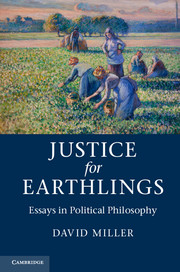Book contents
- Frontmatter
- Contents
- Acknowledgements
- Introduction
- 1 Political philosophy for Earthlings
- 2 Two ways to think about justice
- 3 Social justice in multicultural societies
- 4 Liberalism, equal opportunities and cultural commitments
- 5 Equality of opportunity and the family
- 6 Justice and boundaries
- 7 Social justice versus global justice?
- 8 ‘Are they my poor?’: the problem of altruism in a world of strangers
- 9 Taking up the slack? Responsibility and justice in situations of partial compliance
- 10 A tale of two cities; or, political philosophy as lamentation
- Index
- References
8 - ‘Are they my poor?’: the problem of altruism in a world of strangers
Published online by Cambridge University Press: 05 February 2013
- Frontmatter
- Contents
- Acknowledgements
- Introduction
- 1 Political philosophy for Earthlings
- 2 Two ways to think about justice
- 3 Social justice in multicultural societies
- 4 Liberalism, equal opportunities and cultural commitments
- 5 Equality of opportunity and the family
- 6 Justice and boundaries
- 7 Social justice versus global justice?
- 8 ‘Are they my poor?’: the problem of altruism in a world of strangers
- 9 Taking up the slack? Responsibility and justice in situations of partial compliance
- 10 A tale of two cities; or, political philosophy as lamentation
- Index
- References
Summary
‘Are they my poor?’ This question comes, as readers may know, from an essay by Ralph Waldo Emerson entitled ‘Self Reliance’. I do not have a very secure grasp either of Emerson's general philosophy of life or of the particular point of view that he expresses in this essay, but it is safe to say that Emerson was not keen on altruism as we would normally understand it. He believed that when each person cultivated his or her individuality – developed and expressed all his or her mental and physical powers to the full – other people would benefit spontaneously, whereas activities performed to meet these others’ expectations or demands would diminish both giver and receiver. The surrounding passage reads:
Do not tell me, as a good man did today, of my obligation to put all poor men in good situations. Are they my poor? I tell thee, thou foolish philanthropist, that I grudge the dollar, the dime, the cent, I give to such men as do not belong to me and to whom I do not belong.
And there follows a list of charitable causes in relation to which, Emerson says, ‘though I confess with shame I sometimes succumb and give the dollar, it is a wicked dollar, which by and large I shall have the manhood to withhold’.
You may feel, then, that this is not a very promising place to begin an essay on altruism, though on Emerson's behalf it should be said that he did sometimes hand over the dollar, and often a great deal more, in particular for the cause of abolishing slavery to which in the 1850s especially he devoted a great deal of his time and energy. So perhaps we can read his remarks differently, not as repudiating any idea of altruistic concern for the poor, but as one way of signalling the problem that I want to address, as the frustration of a man who having given a good deal to one very worthy cause found himself inundated with requests for other kinds of help. The question it is very natural to ask in such circumstances is ‘Why me?’ ‘Why is it my responsibility to look after these particular needy people?’ For although there may be many people in need, there are also very many who would be able to offer relief if they chose. So how can I decide where to direct my efforts and how much of the burden I should shoulder?
- Type
- Chapter
- Information
- Justice for EarthlingsEssays in Political Philosophy, pp. 183 - 205Publisher: Cambridge University PressPrint publication year: 2013
References
- 2
- Cited by



